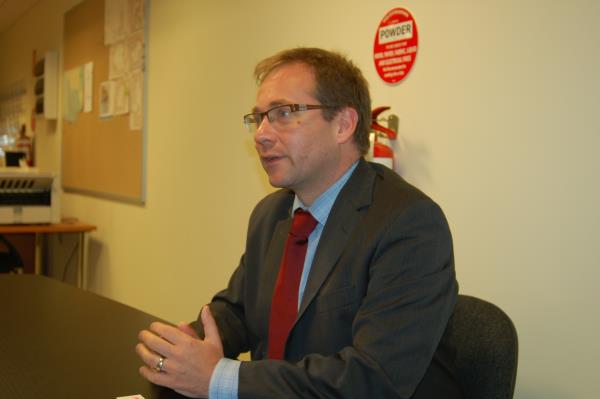
By BEN CAMERON AND ANEEKA SIMONIS
HE’S been a City of Casey councillor, an advisor to both former Victorian Premier Steve Bracks and current Federal Opposition Leader Bill Shorten and now he’s an Upper House member for Eastern Victoria. BEN CAMERON and ANEEKA SIMONIS spoke to Daniel Mulino about insular politicians, his commitment to seeing a dangerous level crossing removed and Cardinia Shire Council ratepayers getting a fair deal with their rates.
BEN: You spent several years with a private sector consulting firm which advised government on financing major infrastructure projects, you must have a strong opinion on East West Link then?
DANIEL: It was really useful getting the private sector perspective on some of the bigger infrastructure projects that the State Government’s going to have to manage. It’s a difficult situation, and to be partisan, I’m not going to say anything new here but I think we were left with an awful situation with a government that signed such a huge contract in such controversial circumstances.
BEN: Where is this issue heading though?
DANIEL: We’re in the middle of negotiations with the consortium at the moment trying to minimise the state’s exposure.
BEN: What do you think is the best option?
DANIEL: It’s not really my place to comment in the middle of negotiations, I don’t want to say anything that’s going to imperil those discussions.
BEN: What would you say to the average person though who is wondering what is going on?
DANIEL: The two things I’d say is the government has reprioritised away from a road that had a terrible cost-benefit ratio. We’ve changed the priority to level crossings. What the government is doing is everything to protect the taxpayers’ interest.
BEN: In terms of level crossings, when can local drivers expect works to begin on the Clyde Road level crossing?
DANIEL: I can’t comment on specific crossings. All I can say is the program as a whole is on track, and that lot of action is underway. We’re in our first 100 days still and on transport, a lot has happened. Within the first 100 days it’s difficult to map out when all the 50 (crossings) will happen. You can’t answer those kind of questions in three months.
BEN: You worked with Bill Shorten, what did you learn from him specifically?
DANIEL: The one thing I think that Bill does very well is he reaches out to external experts. A lot of politicians don’t’ do that. A lot of politicians rely on their existing networks or departmental briefings. But Bill will reach out to a wide range of people when forming views, I think leaders need to do that more, particularly the complexity of things they’re facing.
BEN: So politicians can be a bit too insular?
DANIEL: I wouldn’t want to make a statement that bold but I just think Bill is very good at reaching out. I also think he is good at arriving at consensus with complex issues.
ANEEKA: What kind of complex issues are facing the Cardinia shire?
DANIEL: Level crossings is one. You can hand out bits of paper at a train station, but when you hand out a bit of paper with level crossings on it, people often stop and come back and talk. I’m very keen to stay abreast of what’s happening with the Minister of Public Transport and the Minister for Roads on that. Transport is a big issue for people in this area.
ANEEKA: Any other big issues?
DANIEL: One that a few residents’ associations have raised is rate capping. It’s a complex one. My experience as a councillor gives me certain perspectives on this. What we’ve seen in the growth councils in particular, we’ve seen rates rise up to eight to 10 per cent. That can’t occur over a long period of time when wages are growing at four per cent, the maths don’t add up. But I understand that in a growth council, a population that’s growing at 8000 a year and you’re trying to build infrastructure for the future, which is a laudable goal, you can’t fit new infrastructure that’s growing at four per cent. It’s tricky.
BEN: What do you think of Cardinia Shire Council’s new headquarters in Officer?
DANIEL: I haven’t been yet. I think it opened on a sitting day. I don’t’ want to second guess that element of their budget process. Getting a modern work place that promotes high productivity can generate a lot of efficiencies and savings over the long run. A lot of councils like Casey and Cardinia now have huge workforces. A lot of these buildings don’t come cheap, but if they’re done well, it generates a lot of productivity gains. I don’t want to second guess that precise investment.
BEN: When can residents expect an announcement on the State Government’s development of the old council buildings into a new health hub?
DANIEL: I can take that on notice, I’ll get back to you on that.
BEN: Is the Upper House still relevant these days?
DANIEL: It’s good to have somebody review government legislation. It’s very relevant in that basically when we put out legislation now … we have to deal with a multiplicity of parties. A lot of people think it’s parliament at its best. People often focus on question time as a bit of a circus, but people’s passions are on display. Question time is the adversarial part.






